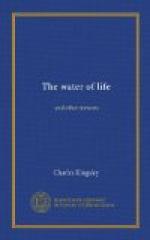Moreover, a very slight earthquake may do fearful damage. People who only read of them, fancy that an earthquake, to destroy man and his works, must literally turn the earth upside down; that the ground must open, swallowing up houses, vomiting fire and water; that rocks must be cast into the sea, and hills rise where valleys were before. Such awful things have happened, and will happen again: but it does not need them to lay a land utterly waste. A very slight shock—a shock only a little stronger than was felt last Wednesday morning, might have—one hardly dare think of what it might have done in a country like this, where houses are thinly built because we have no fear of earthquakes. Every manufactory and mill throughout the iron districts (where the shock was felt most) might have toppled to the earth in a moment. Whole rows of houses, hastily and thinly built, might have crumbled down like packs of cards; and hundreds of thousands of sleeping human beings might have been buried in the ruins, without time for a prayer or a cry.
A little more—a very little more—and all that or more might have happened; millions’ worth of property might have been destroyed in a few seconds, and the prosperity and civilization of England have been thrown back for a whole generation. There is absolutely no reason whatever, I tell you, save the mercy of God, why that, or worse, should not have happened; and it is only of the Lord’s mercies that we were not consumed.
Next, earthquakes are utterly uncertain as to time. No one knows when they are coming. They give no warning. Even in those unhappy countries in which they are most common there may not be a shock for months or years; and then a sudden shock may hurl down whole towns. Or there may be many, thirty or forty a-day for weeks, as there happened in a part of South America a few years ago, when day after day, week after week, terrible shocks went on with a perpetual underground roar, as if brass and iron were crashing and clanging under the feet, till the people were half mad with the continual noise and continual anxiety, expecting every moment one shock, stronger than the rest, to swallow them up. It is impossible, I say, to calculate when they will come. They are altogether in the hand of God,—His messengers, whose time and place He alone knows, and He alone directs.
Our having had one last week is no reason for our not having another this week, or any day this week; and no reason, happily, against our having no more for one hundred years. It is in God’s hands, and in God’s hands we must leave it.
All we can say is, that when one comes, it is likely to be least severe in this part of England, and most severe (like this last) in the coal and iron districts of the west and north-west, where it is easy to see that earthquakes were once common, by the cracks, twists and settlements in the rocks, and the lava streams, poured out from fiery vents (probably under water) which pierce the rocks in many places. Beyond that we know nothing, and can only say,—It is of the Lord’s mercies that we are not consumed.




